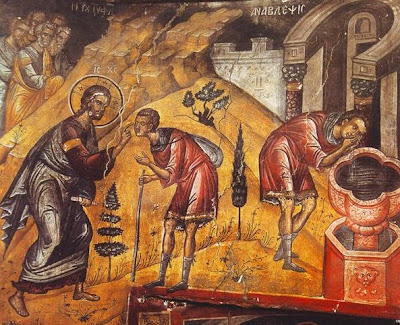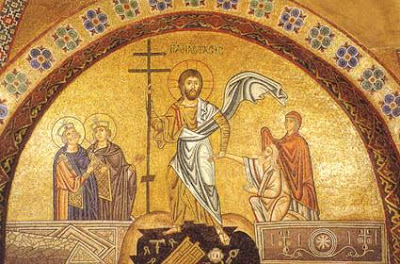In the name of the Father, and of the Son, and of the Holy Spirit, one God, Amen.
Christ is risen!
“Who is to blame?” we ask ourselves whenever something evil or unfortunate happens. Whether on the grand political scale or in our daily lives we want to know “Who is at fault? On whom can we look down?” And from our lofty towers we regard humanity set out below us. We judge our rulers, our politicians, our celebrities, our bosses, our colleagues, our servers, our employees—everyone and anyone for their mistakes, their crimes and misdemeanours, their losses and failures. “Who is to blame?” we ask ourselves rhetorically, “Over whom can I now feel superior?”

We are coming towards the end of the fervency of Pascha, for more than a month we have been celebrating with extra vigour the Resurrection of our Lord, and the final Sunday of this celebration, the end of our memory of Christ’s physical and bodily presence here on this Earth, the Church sets before us a Sign of his power. Is it the Voice of the Lord speaking down from heaven? No. Or the calling down of fire, the raising of the dead, the feeding of a great multitude? No. A man, blind from birth, has another come before him, spit on the ground and from the spittle make clay and mould new eyes for him. This was as repulsive then as it would be today. This is the Sign which the Church, in her great love for you and her great love for me, desires to leave us with as we move into a new season of the Church’s life.
What is the Sign, what is the miracle, here in the scene? Is it that the blind are healed? No, we have encountered this elsewhere. Is it that God reveals himself? No, we have encountered this elsewhere. Is it that the Lord has compassion on a human being? No, we have encountered this elsewhere. It is that God—who formed Adam from the dust of the Earth, who breathed life into his nostrils (Genesis 2:7)—would come down as one of us and complete in you and in me the Creation of humanity.

“Who is to blame?” cry out the disciples, “Rabbi, who sinned, this man or his parents, that he was born blind?” Since their perspective is still of this world, they see the Signs as magic tricks and the Teachings as “food for thought,” they have not come to realise what the Samaritan Woman and the people of Sychar have already seen (John 4:1–42), in whom the nobleman whose son was healed became faithful (John 4:46–54), in what the Paralysed Man by the Sheep Gate believed (John 5:1–15), in what the man born blind will discover, that Jesus is the Christ, the Son of God, the Saviour of the World. For once they behold Jesus as the Christ then they “receive power when the Holy Spirit has come upon [them]” (Acts 1:8) and do not seek to blame but preach the Gospel of the Kingdom to the ends of the Earth.
You and I, dear brothers and sisters in Christ, are likewise born blind: blind to the spiritual life, blind to the love of God through love for the neighbour, blind to the way in which we judge one another. And the Lord stands before you and before me, spits on the ground and from the spittle makes clay and thrusts it into our eye-sockets. It is disgusting, it is repulsive, it is an affront against our ill-advised dignity. And he says directly to you and to me, “Go, wash in the pool of Siloam which means Sent.” He goes on, “For I wish to send you to the world, to your neighbour, to your enemies and friends alike, and be my witnesses to them of the Gospel of the Kingdom.”
And I may choose: I could remain disgusted and repulsed by the actions of God and reject them or I could heed his call and become his disciple; I could remain a citizen of this world or a citizen of the next, I could choose life or choose death. Which of these options will you, my dear brothers and sisters in Christ, choose?
Christ is risen!
To our incarnate, crucified and risen Lord, God and Saviour Jesus Christ be all glory, honour and might, together with his Unoriginate Father and the All-holy, Good and Life-giving Spirit, Amen.
In those days, as we apostles were going to the place of prayer, we were met by a slave girl who had a spirit of divination and brought her owners much gain by soothsaying. She followed Paul and us, crying, “These men are servants of the Most High God, who proclaim to you the way of salvation.” And this she did for many days. But Paul was annoyed, and turned and said to the spirit, “I charge you in the name of Jesus Christ to come out of her.” And it came out that very hour. But when her owners saw that their hope of gain was gone, they seized Paul and Silas and dragged them into the market place before the rulers; and when they had brought them to the magistrates they said, “These men are Jews and they are disturbing our city. They advocate customs which it is not lawful for us Romans to accept or practice.” The crowd joined in attacking them; and the magistrates tore the garments off them and gave orders to beat them with rods. And when they had inflicted many blows upon them, they threw them into prison, charging the jailer to keep them safely. Having received this charge, he put them into the inner prison and fastened their feet in the stocks. But about midnight Paul and Silas were praying and singing hymns to God, and the prisoners were listening to them, and suddenly there was a great earthquake, so that the foundations of the prison were shaken; and immediately all the doors were opened and every one’s fetters were unfastened. When the jailer woke and saw that the prison doors were open, he drew his sword and was about to kill himself, supposing that the prisoners had escaped. But Paul cried with a loud voice, “Do not harm yourself, for we are all here.” And he called for lights and rushed in, and trembling with fear he fell down before Paul and Silas, and brought them out and said, “Men, what must I do to be saved?” And they said, “Believe in the Lord Jesus, and you will be saved, you and your household.” And they spoke the word of the Lord to him and to all that were in his house. And he took them the same hour of the night, and washed their wounds, and he was baptized at once, with all his family. Then he brought them up into his house, and set food before them; and he rejoiced with all his household that he had believed in God.
— Acts 16:16–34
At that time, as Jesus passed by, he saw a man blind from his birth. And his disciples asked him, “Rabbi, who sinned, this man or his parents, that he was born blind?” Jesus answered, “It was not that this man sinned, or his parents, but that the works of God might be made manifest in him. We must work the works of him who sent me, while it is day; night comes, when no one can work. As long as I am in the world, I am the light of the world.” As he said this, he spat on the ground and made clay of the spittle and anointed the man’s eyes with the clay, saying to him, “Go, wash in the pool of Siloam” (which means Sent). So he went and washed and came back seeing. The neighbors and those who had seen him before as a beggar, said, “Is not this the man who used to sit and beg?” Some said, “It is he”; others said, “No, but he is like him.” He said, “I am the man.” They said to him, “Then how were your eyes opened?” He answered, “The man called Jesus made clay and anointed my eyes and said to me, ‘Go to Siloam and wash’; so I went and washed and received my sight.” They said to him, “Where is he?” He said, “I do not know. They brought to the Pharisees the man who had formerly been blind. Now it was a sabbath day when Jesus made the clay and opened his eyes. The Pharisees again asked him how he had received his sight. And he said to them, “He put clay on my eyes and I washed, and I see.” Some of the Pharisees said, “This man is not from God, for he does not keep the sabbath.” But others said, “How can a man who is a sinner do such signs?” There was a division among them. So they again said to the blind man, “What do you say about him, since he has opened your eyes?” He said, “He is a prophet. The Jews did not believe that he had been blind and had received his sight, until they called the parents of the man who had received his sight, and asked them, “Is this your son, who you say was born blind? How then does he now see?” His parents answered, “We know that this is our son, and that he was born blind; but how he now sees we do not know, nor do we know who opened his eyes. Ask him; he is of age, he will speak for himself.” His parents said this because they feared the Jews, for the Jews had already agreed that if anyone should confess him to be Christ he was to be put out of the synagogue. Therefore his parents said, “He is of age, ask him. So for the second time they called the man who had been blind, and said to him, “Give God the praise; we know that this man is a sinner.” He answered, “Whether he is a sinner, I do not know; one thing I know, that though I was blind, now I see.” They said to him, “What did he do to you? How did he open your eyes?” He answered them, “I have told you already and you would not listen. Why do you want to hear it again? Do you too want to become his disciples?” And they reviled him, saying, “You are his disciple, but we are disciples of Moses. We know that God has spoken to Moses, but as for this man, we do not know where he comes from.” The man answered, “Why, this is a marvel! You do not know where he comes from, and yet he opened my eyes. We know that God does not listen to sinners, but if anyone is a worshiper of God and does his will, God listens to him. Never since the world began has it been heard that anyone opened the eyes of a man born blind. If this man were not from God, he could do nothing.” They answered him, “You were born in utter sin, and would you teach us?” And they cast him out. Jesus heard that they had cast him out, and having found him he said, “Do you believe in the Son of man?” He answered, “And who is he, sir, that I may believe in him?” Jesus said to him, “You have seen him, and it is he who speaks to you.” He said, “Lord, I believe”; and he worshiped him.
— John 9:1–38
